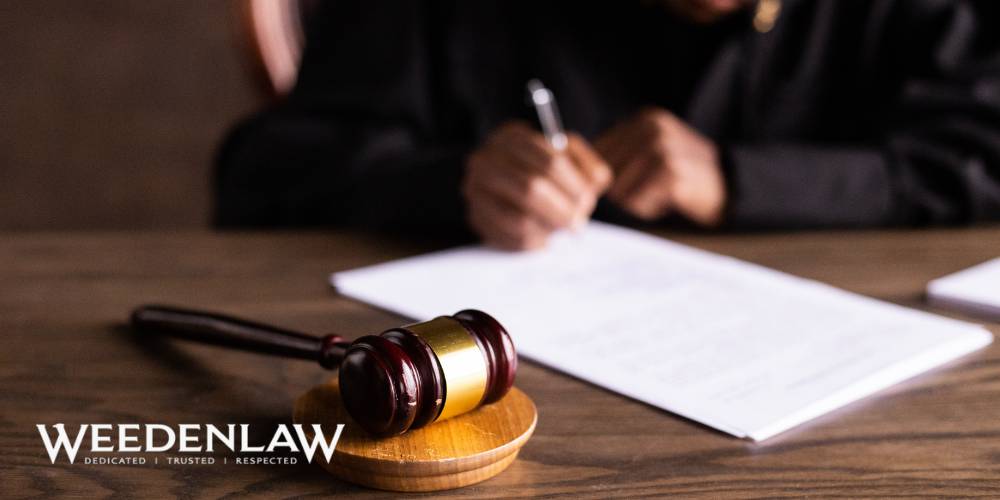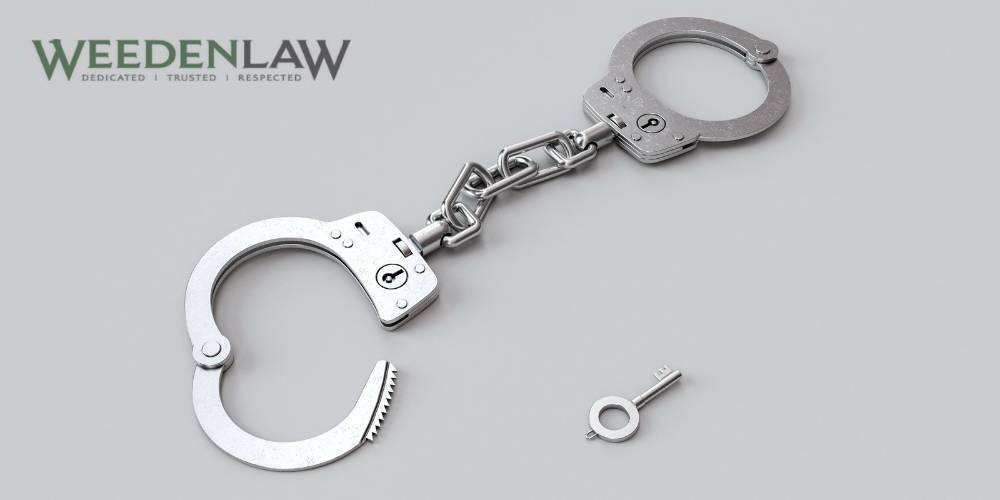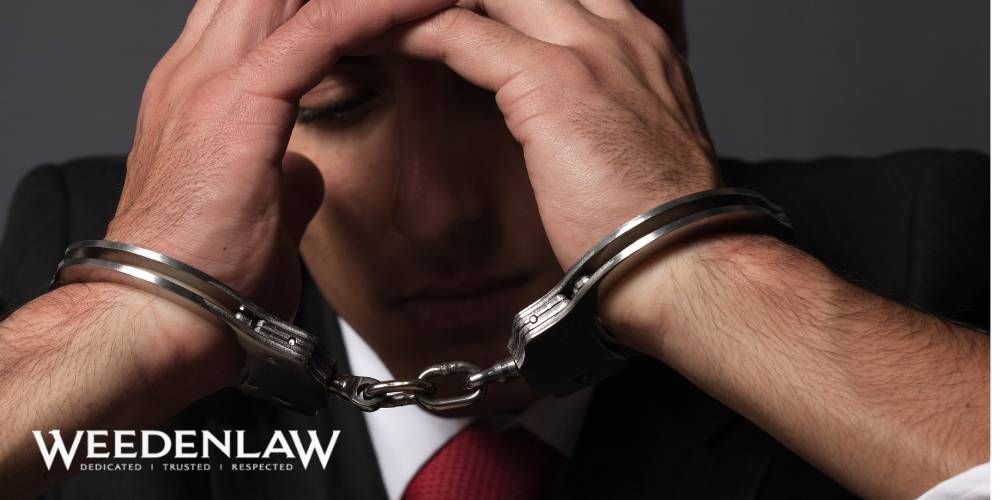Bail Amounts by Crime Colorado
When someone is arrested, one of the court’s first decisions is to determine bail amounts by crime. Colorado law dictates that defendants facing criminal charges may be released on bail pending trial, but there are a number of factors that influence the bail amount, and, ultimately, it is up to the judge.
If you or a loved one has been arrested and needs help securing bail, understanding the process is the first step. At WeedenLaw, our legal team is here to help you achieve that first step and hopefully guide you through the next several steps as you navigate the often complicated legal system. We are prepared to assist with bail hearings, negotiate bond terms, and protect your rights at every stage. Led by experienced Denver defense lawyer Jeff Weeden, our law firm provides strategic, results-driven representation in every case we take on. If you need urgent help with bail or criminal charges, call (720) 307-4330 or reach out online to request a free consultation.
Understanding Denver, Colorado Bail Bonds
According to the 8th Amendment, anyone arrested for a crime is entitled to a fair bail amount. Bail is not meant to be a punishment but rather a financial guarantee that the defendant will return for scheduled court appearances. When bail is paid, the defendant is conditionally released from custody. As long as they attend every court date and hearing, they will get their money back. However, if they fail to appear, the court may keep the money or seize collateral that was pledged in exchange for release. For people struggling to afford bail, this process can create significant financial hardship.
If your bail is set unreasonably high or does not match the seriousness of the alleged offense, it is important to speak with a Colorado criminal attorney right away. They will ensure your rights are protected under the law and explore your legal options for reducing the amount.
How Do You Get a Bond?
Judges decide whether or not to offer bond at their discretion. After an arrest, the judge will either deny bail, set bail, or grant another type of bond. If the defendant cannot afford bail, their attorney may request a bail hearing to ask the court to reduce the bail amount, grant release without requiring security, or consider other release options.
Types of Bail Bonds in Colorado
C.R.S. 16-4-104 outlines the types of bonds that the Colorado courts can set. There are four main types of bail bonds:
- Cash Bail: Involves providing cash security in exchange for the defendant’s release. Payment of the full bail amount is required before release.
- Property Bond: Uses real estate as collateral, typically valued at 1.5 times the bail amount. Courts will hold property titles until the defendant has fulfilled their appearance requirements.
- Surety Bond: A bondsman posts bail for a fee, usually a percentage of the full amount. The bondsman agrees to pay the bail amount in full to the court and incurs the risk of losing the bond if the defendant fails to attend court dates.
- Personal Recognizance Bond: No upfront payment is required, but the defendant must sign a promise to return to court. If the defendant fails to appear, the court can issue a warrant for their arrest and impose a harsher sentence.
How is Bail Amount Determined?
Each jurisdiction sets its bail costs differently, with courts taking into account a wide range of factors. Some jurisdictions use standardized schedules for bail based on the crimes committed. This means that an assault charge could result in a $10,000 bail in one jurisdiction but $200,000 in another.
In severe cases, like for defendants accused of violent crimes or those deemed a flight risk, judges may elect to deny bail altogether. The rationale is that the defendant may pose a danger to the community if released or attempt to flee the country. Many courts in Colorado use the Colorado Pretrial Assessment Tool (CPAT) to evaluate factors like housing stability, substance use, mental health, supervision history, and whether other charges are pending trial. Based on this information, the court assigns a risk category from 1 to 4, which helps determine the bail amount by crime and whether someone can be released pending trial.
High End vs. Low End Bail Amounts
The lowest bail amounts apply to petty crimes and misdemeanors, starting as low as approximately $50 to $500. High-end bail amounts can reach up to $1,000,000 or more and usually apply to very serious crimes such as Class 1 felonies.
Average Bail Amount for a Felony
Bail amounts for felonies increase with the classification of the offense:
- Class 6 felony: $2,000–$5,000
- Class 5 felony: $5,000–$10,000
- Class 4 felony: $10,000–$25,000
- Class 3 felony: $25,000–$50,000
- Class 2 felony: $50,000–$100,000+
- Class 1 felony: Typically no bail
These amounts vary depending on the court district.
Average Bail Amount for a Misdemeanor
Because misdemeanors are less serious offenses than felonies, the bail is lower. However, as with felony bail amounts, the individual’s prior history will factor into the amount. Typical ranges are:
- Petty offenses: $50–$500
- Class 3 misdemeanors: $500–$1,000
- Class 2 misdemeanors: $1,000–$2,000
- Class 1 misdemeanors: $2,000–$5,000
Even though a misdemeanor is less serious than a felony, it can still result in a conviction that includes jail time, significant fines, and other consequences. Seek the assistance of Colorado misdemeanor defense attorney Jeff Weeden to increase your chances of avoiding conviction.
What Crimes Can You Get Bail for in Colorado?
In most cases, defendants charged with petty offenses, misdemeanors, and even felonies are eligible for bail. The main exception involves Class 1 felonies, typically resulting in a no-bond hold. In rare situations, a court order may allow bail to be set for these charges.
Can You Get Bail If You’ve Murdered Someone?
Bail eligibility for murder charges depends on how the offense is classified. First-degree murder is a Class 1 felony and typically not bondable unless a specific court order is issued. Defendants facing lesser charges, such as second-degree murder or manslaughter, are more likely to qualify for bail.

Average Bail Amounts By Crime
*Keep in mind that these are approximate figures.*
How Much is Bail for Murder in Colorado?
Bail for second-degree murder in Colorado is typically set around $250,000. If the defendant is charged as an accessory to first-degree murder, the bail amount may increase to $500,000. In rare cases where first-degree murder qualifies for bail, it is usually set near the $1,000,000 mark.
How Much is Bail for Manslaughter in Colorado?
Bail amounts for manslaughter charges in Colorado vary depending on whether the offense is classified as voluntary or involuntary. Bail for voluntary manslaughter tends to be set at $100,000. Involuntary manslaughter in Colorado, which is caused by a non-felony crime like reckless driving, carries a lower bail amount of around $25,000.
How Much is Bail for Misdemeanor Assault in Colorado?
Misdemeanor assault, also called third-degree assault, involves negligently causing bodily injury to another person with a deadly weapon. In Colorado, this Class 1 misdemeanor typically carries a bail amount between $2,000 and $5,000, depending on the case details and the defendant’s prior record.
How Much is Bail for Assault and Battery in Colorado?
Minor assault cases may have bail set around $2,500, while more serious charges involving intent to commit violent crimes can reach $1,000,000. If you’re facing assault or menacing charges, contact a Denver assault and battery defense attorney like Jeff Weeden right away.
How Much is Bail for Aggravated Assault in Colorado?
Aggravated assault in Colorado is a more serious form of assault that includes certain aggravating factors such as using a deadly weapon, causing serious bodily harm, targeting a protected individual like a police officer, or acting with intent to inflict severe injury. Due to the increased severity, bail for aggravated assault usually ranges from $10,000 to over $50,000.
How Much is a Bond for Aggravated Assault With a Deadly Weapon?
For assault with a deadly weapon, the bail is often around $25,000. If that weapon is a firearm, the bail may increase to around $50,000.
What is the Average Bail Amount for Domestic Violence in Colorado?
Bail for domestic violence charges typically ranges from $2,500 to $5,000, but can increase to $10,000 or more in cases involving sexual battery or violence against a spouse. If you’ve been arrested, speak with a Denver domestic violence defense attorney at WeedenLaw right away for help protecting your rights and securing your release.
How Much is Bail for Aggravated Stalking in Colorado?
A first stalking offense is a Class 5 felony, while a second offense is elevated to a Class 4 felony, meaning bail typically ranges from $5,000 to $25,000. However, aggravating factors, such as an underage victim or stalking in violation of a protective order in Colorado, may significantly increase the bail amount for stalking charges in Colorado.
How Much is Bail for a Gun Charge in Colorado?
Misdemeanor gun charges typically carry bail amounts between $1,000 and $5,000, while felony gun charges may result in much higher bail, depending on the severity of the offense.
How Much is Bail for Resisting Arrest in Colorado?
You can be charged with a Class 2 misdemeanor for resisting arrest in Colorado. Courts set bail for resisting arrest at approximately $1,000 to $2,000.
How Much is Bail for Theft in Colorado?
Theft charges in Colorado are based on the value of the stolen property. Petty theft involves items worth less than $300 and may carry bail as low as $50. Cases involving $300 to $2,000 are charged as misdemeanors, while theft of more than $2,000 is a felony.
As such, bail for theft can range from a few hundred dollars to over $100,000, depending on the classification and circumstances. Working with a theft defense lawyer in Colorado can help protect your rights and build a strong defense.
How Much is Bail for Shoplifting in Colorado?
Again, bail can be as low as $50 for minor cases and exceed $100,000 for felony-level theft. If you’re facing charges, a Denver, CO shoplifting attorney can help you fight for reduced bail and a favorable outcome.
How Much is Bail for Robbery in Colorado?
There are several tiers of robbery charges in Colorado. A first-degree robbery will typically come with a $100,000 bail amount. For second-degree robbery, it tends to be closer to $50,000.
How Much is Bail for Armed Robbery in Colorado?
The minimum of $25,000 for robberies escalates if the individual had a prior felony, used a deadly weapon, or threatened physical harm. If you’ve been charged, speak with an experienced an experienced Colorado robbery defense attorney ASAP.
What is the Bail for Carjacking in Colorado?
Carjacking is when someone takes a vehicle with the threat of force while the owner is still present in the car. The carjacking bail amount tends to be between $25,000 and $100,000. However, Colorado motor vehicle theft, which is when someone takes a car without the owner being present, requires around $2,500-$5,000 bail.
What is the Average Burglary Bail Amount in Colorado?
The minimum bail amount for burglary charges in Colorado is $20,000. However, in some areas, it might be set at $50,000. When a burglary takes place on a residential property, the bail amount will be $50,000. If there is a sexual or violent offense that occurs during a burglary, the bail amount often escalates to $1,000,000.
What is the Average Bail Amount for Drug Possession in Colorado?
There is a wide range of bail amounts for drug offenses in Colorado. For first-time, simple possession offenders, the bail amount could be around $2,500 or less. For a second or third offense, the amount is often much higher.
How Much is Bail for a DUI Charge in Colorado?
Bail for a DUI in Colorado typically starts around $1,000 for first-time misdemeanor offenses. However, if there are aggravating factors or multiple prior offenses, the charge can become a felony, with bail amounts reaching up to $50,000. Denver DUI attorney Jeff Weeden can help pursue reduced charges or dismissal if you’ve been arrested for DUI.
How Much is Bail for Molestation in Colorado?
Bail for molestation typically starts around $2,000 to $5,000, with higher amounts set for felony-level offenses.
What is the Average Sexual Assault Bond Amount in Colorado?
Both first and second-degree sexual assault are felonies in Colorado. The bail amount tends to be up to $750,000. It can reach $1,000,000 if there are additional aggravating factors, such as the victim being pregnant or suffering a severe physical injury.
How Much is Bail for Rape in Colorado?
Bail for rape charges typically starts at $750,000, but may increase to $1,000,000 or more if the case involves aggravating factors.
How Much is Bail for Child Endangerment in Colorado?
Child endangerment charges range from Class 3 misdemeanors to Class 2 felonies, meaning courts may require bail amounts of anywhere from $500 to over $100,000.
How Much is Bail for Arson in Colorado?
As with most cases, the full bail amount for Colorado arson charges depends on the classification of the offense, the defendant’s prior criminal history, and other factors. That being said, misdemeanor arson typically results in bail between $1,000 and $2,000, while felony arson can lead to bail amounts of $50,000 to $100,000 or more.
How Much is Bail for a Restraining Order Violation in Colorado?
Restraining order violations carry one of the widest ranges of bail amounts. Courts generally determine bail based on a criminal assessment, but additional factors also come into play. The income level of the jurisdiction can influence the decision, as can the specific details of the case. As a result, bail for restraining order violations may range anywhere from $1,000 to $15,000.
When setting bail, the court will weigh the seriousness of the alleged violation as well as the defendant’s prior history. Multiple or repeated restraining order violations can lead to higher bail amounts, reflecting the court’s concern about risk and compliance. These charges are serious and can carry lasting consequences. The legal team at Weeden Law can explain what happens if you violate a restraining order in Colorado and provide strong legal representation.

Do You Have to Pay the Full Bond Amount?
If the court sets a cash bail, you must pay the full amount to be released. However, other options exist, like hiring a bail bondsman to post it for you for a percentage of the full bail amount.
How Much Bail Do You Actually Have To Pay?
Personal recognizance bonds require only a signed agreement to return to court. You can also reduce upfront costs by hiring a bail bondsman for a nonrefundable fee, typically a percentage (10%, for example) of the total bail.
How Jeff Weeden Can Help Fight Against Unfair Bail Amounts in Denver, CO
Nobody should have to sit in jail simply because their bail amount is unattainable. If you believe your bail is set too high or you cannot afford it, speak with Denver criminal attorney Jeff Weeden ASAP. He can review your record, the circumstances of your case, and the evidence presented to determine whether the amount is reasonable compared to what is typical in your jurisdiction.
Do not allow an unfair bail amount to keep you from seeing your family. Contact us today for a free case evaluation.
Contact WeedenLaw for Immediate Help With Bail in Colorado
If you or a loved one has been arrested, time is critical. Bail hearings move quickly, and every moment spent in jail can affect your future. Call WeedenLaw today at (720) 307-4330 for immediate legal help. Attorney Jeff Weeden is ready to fight for a fair bail amount and work toward your release.















